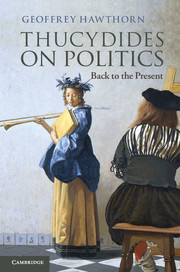Book contents
- Frontmatter
- Dedication
- Contents
- Preface and acknowledgements
- Chronology 545–323 BC
- List of maps
- Maps
- 1 The text
- 2 Writing power: Athens in Greece 478–435
- 3 Explaining the war: stated reasons 435–432
- 4 Explaining the war: true reasons 432
- 5 Judgements 431–430
- 6 Absent strategies 430–428
- 7 Speech and other events 428–427
- 8 Meaning and opportunity 426–424
- 9 Necessities 424
- 10 Interests 423–421
- 11 Emotion in deed 420–416
- 12 Purposes and decisions 415
- 13 Character and circumstance 414–413
- 14 One war 413–411
- 15 Back to the present
- Synopsis of the text by book and year
- Further reading
- References
- Index
8 - Meaning and opportunity 426–424
Published online by Cambridge University Press: 05 June 2014
- Frontmatter
- Dedication
- Contents
- Preface and acknowledgements
- Chronology 545–323 BC
- List of maps
- Maps
- 1 The text
- 2 Writing power: Athens in Greece 478–435
- 3 Explaining the war: stated reasons 435–432
- 4 Explaining the war: true reasons 432
- 5 Judgements 431–430
- 6 Absent strategies 430–428
- 7 Speech and other events 428–427
- 8 Meaning and opportunity 426–424
- 9 Necessities 424
- 10 Interests 423–421
- 11 Emotion in deed 420–416
- 12 Purposes and decisions 415
- 13 Character and circumstance 414–413
- 14 One war 413–411
- 15 Back to the present
- Synopsis of the text by book and year
- Further reading
- References
- Index
Summary
Thucydides claims that he saw at the start that the war would be ‘more worthy of account than any previous one…on the grounds that both sides came into the war at the height of their powers and in a full state of military readiness’ and that ‘the rest of the Greek world had already taken sides…or was now planning to do so’. In the same opening section but in what must have been a late insertion, he writes that it was ‘certainly the greatest ever upheaval among the Greeks, and one which affected a significant part of the barbarian world too – even, you could say, most of mankind’ (1.1.1–2). But beyond these remarks on its scale and effect, together with two incomplete and arguably misleading views on why Athens was defeated, the first of which I mentioned at the end of Chapter 5, the second of which I come to in Chapter 12, and his apparently considered view that it was one long war (5.26.2–4, but cf. 7.28.3 and Chapter 14), he ascribes no one meaning – dispositional, associational or consequential – to it, and draws no lesson.
His exile did give him time ‘to study matters more closely’, but he makes no mention of considering them more broadly (5.26.5); even if he had written ten books rather than eight, as Hunter Rawlings imagines him thinking of doing, the end of the tenth might well have been as inconclusive as the end of the fifth. His inclination always was to take readers back to what Hobbes called ‘the drifts and counsels of actors to their seat’, to shape his account by what the actors themselves thought they were doing, in so far as they thought about it at all, rather than by what he and the readers knew had happened later. He does in this respect write rather like a modern novelist or in the parts of the text that contain speeches, a dramatist without a commenting chorus. But as I said in Chapter 1, authors of fictions usually convey the sense of an ending, which he does not. Writing against a culture that had long been infused with the anticipation of meaningful outcomes – though a culture that Francis Dunn suggests was in this respect changing – he offers what Henry James, writing about someone else, described as a ‘frank provisional empiricism that is more telling than any premature philosophy’.
- Type
- Chapter
- Information
- Thucydides on PoliticsBack to the Present, pp. 102 - 115Publisher: Cambridge University PressPrint publication year: 2014



